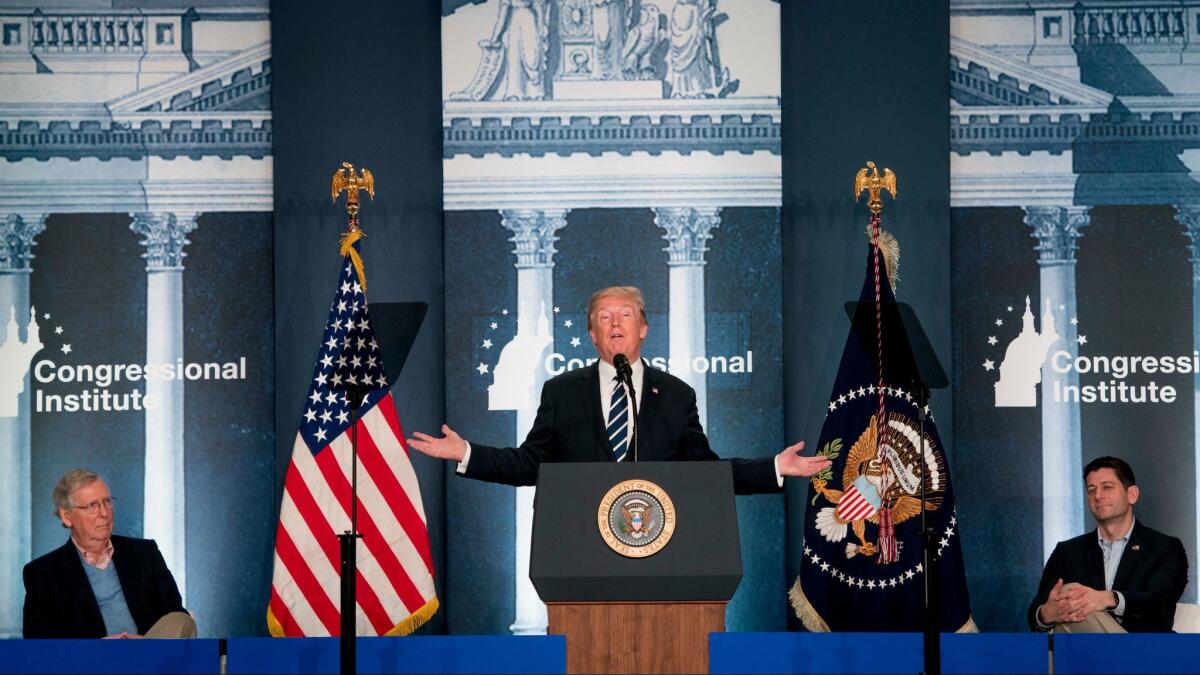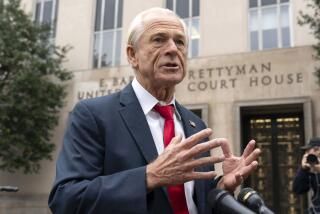Legal experts say White House has expanded use of executive privilege without actually invoking it

When President Trump’s former campaign manager, Corey Lewandowski, appeared in January before the House Intelligence Committee investigating Russian political interference, he refused to answer questions about his conversations with Trump after he was fired by the future president in June 2016.
The Republicans running the panel responded not with a subpoena, which Congress can use to compel testimony. They invited Lewandowski to return when he was ready, and he’s scheduled to testify again on Thursday.
Stephen K. Bannon, the former White House chief strategist, Donald Trump Jr., the president’s eldest son, and Hope Hicks, the outgoing communications director, also have declined to discuss certain topics in closed-door House committee hearings.
Over in the Senate, top Trump administration intelligence and law enforcement officials, most notably Atty. Gen. Jeff Sessions, have refused to discuss their private conversations with Trump, at least in public hearings, regarding Russia and other issues.
Most of the conflicts over congressional testimony have revolved around executive privilege, the president’s legal authority to keep some conversations and other material secret to protect internal deliberations. Although the White House hasn’t formally invoked the privilege, Trump’s current and former aides said they would not answer questions to protect the president’s right to cite the privilege later should he seek to do so.
Legal experts said the White House had significantly broadened the traditional use of executive privilege to direct individuals to avoid answering questions about specific conversations with the president.
The Trump White House is ”preventing any testimony from people on the grounds that something, at some point, is potentially covered by executive privilege,” said Mark J. Rozell, a professor at George Mason University who has studied the presidency.
“Then it becomes a blanket protection to prevent any and all questions from current and former staff, which is an almost breathtaking notion of executive privilege,” he added.
Robert Bauer, who served as White House counsel under President Obama, said the Trump administration “is attempting something quite new.”
“Normally, an administration advances a claim of executive privilege, then negotiates around it to accommodate the Congress without forcing the conflict to outright confrontation,” Bauer said.
In this case, he said, current and former Trump aides have declined “to answer questions on the grounds that they were instructed not to do so. This is not standard practice in dealing with unwanted congressional inquiries, and there is no constitutional basis for it.”
Jim Schultz, a former deputy counsel in Trump’s White House who now works at the Cozen O’Connor law firm, said there was nothing wrong with safeguarding the president’s prerogative to keep some information secret.
“It’s the obligation of the White House counsel to protect the institution of the White House and the executive privilege that goes along with it,” Schultz said.
“If there were another party in the White House, the Democrats would not be thumping away about it,” he added.
Follow live coverage of the Trump administration on Essential Washington »
Rep. Jerrold Nadler of New York, the top Democrat on the House Judiciary Committee, conceded that partisanship could be at play. But he said Republicans were bending over backward to accede to White House efforts to rope off areas of inquiry.
“I’ve rarely seen a total surrender, a total failure of congressional oversight,” Nadler said. “They’re going further than the president’s party usually goes.”
Republicans have accused Democrats of conducting a partisan quest to embarrass the president and his inner circle. They also have argued that special counsel Robert S. Mueller III is conducting a criminal investigation of the Russian meddling, and whether Trump or his aides committed any crimes, reducing pressure on Congress to find the answers for themselves.
Still, the pushback is a sharp contrast with how Republicans investigated allegations of wrongdoing in the Obama administration.
As chairman of the House Oversight Committee, Rep. Darrell Issa of California issued more than 100 subpoenas to investigate the failed “Fast and Furious” gun-tracking operation, the Internal Revenue Service’s treatment of conservative groups, and armed attacks on a U.S. diplomatic mission and CIA post in Benghazi, Libya.
Issa also successfully pushed to hold then-Atty. Gen. Eric H. Holder Jr. in contempt of Congress after the Obama administration invoked executive privilege to withhold information from his committee. The Justice Department declined to prosecute Holder, who headed the department, a reminder that the executive branch often has more leverage in disputes with Congress.
Issa declined to be interviewed for this story.
The venue for most conflicts involving the Russia investigation has been the House Intelligence Committee, one of three congressional panels conducting inquiries.
When the House panel interviewed Donald Trump Jr. about his June 2016 meeting at Trump Tower with a Kremlin-linked lawyer, he refused to recount his conversation with his father about the meeting, claiming attorney-client privilege because a lawyer was present at the time.
Bannon, the former White House strategist, rejected to answer any questions from the committee regarding events or conversations after the election. After the committee slapped him with a subpoena, Bannon agreed to return for another hearing.
But during his second appearance, he was only willing to address a pre-determined list of yes or no questions that White House lawyers had helped him prepare.
A spokeswoman for House Speaker Paul D. Ryan, a Wisconsin Republican, declined to discuss whether Bannon would be held in contempt.
A spokesman for Rep. Devin Nunes (R-Tulare), the panel’s chairman, did not respond to a question about how many subpoenas had been issued in the investigation. Rep. K. Michael Conaway (R-Texas) and Rep. Trey Gowdy (R-S.C.) declined requests for interviews.
Rozell, the George Mason professor, said the Constitution’s separation of powers was no longer working as envisioned.
“James Madison would not be happy to see this. He believed each branch of government would zealously defend its prerogatives,” he said. “The administration is essentially preventing the legislative branch from doing its job. And to extent they stand down, it weakens the institution in the long run.”
Twitter: @chrismegerian
ALSO
For Trump’s national security team, addressing the threats means ignoring the tweets
Whatever President Trump has done, it can’t be obstruction of justice, his lawyer argues
More to Read
Get the L.A. Times Politics newsletter
Deeply reported insights into legislation, politics and policy from Sacramento, Washington and beyond. In your inbox three times per week.
You may occasionally receive promotional content from the Los Angeles Times.








